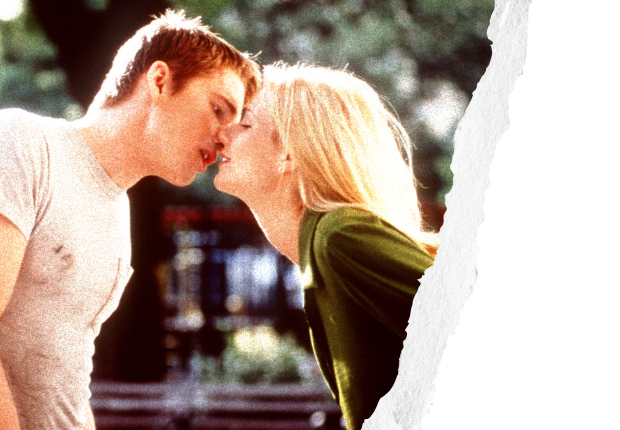Make Expectations Great Again
In high school, I had an English teacher who was an aggressively unattractive, twice-divorced, self-described radical feminist. As far as she could tell, none of these things — the unattractiveness, the divorces, the feminism — were in any way related. She presented the opinions of Betty Friedan, Andrea Dworkin, and Audre Lorde as indisputable facts. You’ve got an SSRI-eyed forty-year-old with two master’s degrees and no kids, spoon-feeding teenage girls dumb ideas from ugly women, and this is what passes for education.
Then, in college, during freshman orientation, I had to sit in an auditorium while some overweight lady delivered an overlong presentation that boiled down to, “Every male student on this campus wants to rape you, and given the opportunity, he definitely will, so when that happens, make sure you blow this complimentary whistle.”
Once I got a job, part of the new hire training program was a “Sexual Harassment in the Workplace” seminar where the Jen Psaki look-a-like from human resources explained how a male co-worker asking you to lunch could be grounds for a hostile work environment complaint.
As a girl in her twenties, this pattern repeats over and over. It’s one thing to recognize it, but it’s another to understand it. The 1998 film, Great Expectations, shows the causes of this type of misandry and its effects on love, or lack thereof, in the modern world. The movie is a contemporized version of Charles Dickens’ 1861 novel, set in 1990s America rather than 1800s England. Ms. Dinsmoor, the character inspired by Dickens’ Miss Havisham, represents women who try to pass their own hatred of men down to younger girls, like some kind of cursed heirloom. Dinsmoor’s spirit lives on today, through the English teacher, the college speaker, the HR specialist, but Great Expectations shows how it can be defeated.
At the start of the film, ten-year-old orphan Finn Bell is being raised by his older sister, Maggie, and her boyfriend, Joe. They’re poor, scraping by on what Joe earns doing lawn work. Finn rides in the back of Joe’s pick-up truck to a gardening job at the mansion of Nora Driggers Dinsmoor, “the richest lady in the Gulf Coast, who had lost her mind thirty years ago when her fiancé left her standing at the altar.” A rusted and vine-crusted sign over her wrought iron gate reads, “Paradiso Perduto,” meaning “Lost Paradise.” The grounds are haunted by the decades-old ghosts of the wedding party that never was. The tables in the garden are still set for the occasion. Rainwater fills grimy goblets. Insects crawl over broken plates. Sunlight fades torn tablecloths. A weather-beaten wedding cake topper depicts a bride clutching the groom’s arm. Dinsmoor really brings “alpha widowed” to a whole new level.
When Finn goes to Dinsmoor’s room, which smells of “dead flowers and cat piss,” he sees an old woman dressed in clothes too young for her, with heavy kohl liner around wild eyes and bright red lipstick on a thin mouth. “Give me your hand,” she says, pressing his palm to her chest. “It’s my heart. It’s broken.”
At Paradiso Perduto, Finn meets Dinsmoor’s niece, a beautiful girl his age named Estella. She treats Finn with disdain and disgust, but he’s still drawn to her.
Every Saturday, for the next several years, Dinsmoor invites Finn to her house, where he falls deeper and deeper in love with the girl who has been trained to hate him. Dinsmoor describes him as “practice” for Estella. “A teaching device,” she explains. “Throw a mouse in with a snake. Teach her to hunt. Swallow food whole, you know?” Women like Dinsmoor use girls like Estella as pawns in their personal revenge fantasies and convince them that this is empowerment.
One night, when Finn and Estella are teenagers, she knocks on the window of his truck.
“You want to get me out of here?” she asks.
He drives her to his house. There, she surveys his room with an appraising gaze, while he sits on the edge of his bed. She walks over to him, bending her knee forward to touch his hand. She steps even closer to him, and he wraps his hand around her leg. His hand moves under her dress, and her hand reaches out to touch his face. She kisses him hard, then pulls away sharply, and leaves as if nothing happened.
The next morning, Finn goes to Paradiso Perduto, in search of Estella, but only finds Dinsmoor, standing on the shore. From Dinsmoor, he learns that Estella has moved out of the country without even saying goodbye to him.
Staring out at the sea, Dinsmoor, lamenting her own lost love, asks, “What kind of creature leaves this woman waiting like a fool?” Turning to Finn, she answers, “A man. A man does this. So men must pay.” She smiles, “Estella will make men weep… She’ll break them… I taught her well… She’ll cut through them like a hot knife through butter.”
Estella is Dinsmoor’s personal weapon of mass destruction, handcrafted for the sole purpose of exacting revenge on men. One man hurt her, so now all men must be hurt. This is feminism in a nutshell. It’s the opposite of Ezekiel 18:20: “The son shall not suffer for the iniquity of the father, nor the father suffer for the iniquity of the son; the righteousness of the righteous shall be upon himself, and the wickedness of the wicked shall be upon himself.” Instead of living in a world where the righteousness of the righteous is upon himself, and the wickedness of the wicked is upon himself, we live in one where the misery of the miserable is upon everyone.
Years later, Finn runs into Estella again in New York. She kisses him and invites him out for drinks. When he arrives at the club, he’s disappointed to find her there with her wealthy boyfriend.
In spite of being in a relationship, Estella later shows up at Finn’s apartment, where she undresses in front of him. Like the last time she was in his room, it ends with her leaving abruptly and apathetically. He runs after her and jumps into her cab.
“What is it like not to feel anything?” he asks.
“Let’s say there was a little girl, and from the time she could understand, she was taught to fear… Let’s say she was taught to fear daylight. She was taught that it was her enemy, that it would hurt her. And then, one sunny day, you ask her to go outside and play, and she won’t,” she answers. “You can’t be angry at her, can you?”
There are so many girls who have been taught to fear men, that they are our enemy, that they will hurt us. This is at least part of the reason that most relationship dynamics today are so dysfunctional. Can you be angry at these girls? Sure, but odds are, it will only make things worse. These girls are effects, not causes. That being said, if they continue down this path, they’ll eventually become the causes of the same problems in the next generation of girls. This cycle breeds misery and feeds on it.
One night, Finn runs to Estella’s house, once again in search of her, and once again, finds only Dinsmoor. When he asks what she’s doing in New York, she replies that she was in town for Estella’s wedding. Finn is crushed by this revelation, and Dinsmoor revels in his despair.
“I suggest you look on the bright side,” she says. “We are together, joined — you, Estella, and I. Pyramid of pain.”
“Give me your hand,” he says, pressing her palm to his chest. “It’s my heart. And it’s broken.”
Finn’s first encounter with Dinsmoor mirrors this final encounter with her. Now as devastated by Estella’s wedding as Dinsmoor was by her own wedding, he has repaid a debt he never owed her. And even with Finn’s broken heart under her hand, Dinsmoor is still miserable. The last time we see her on screen, she’s sobbing and screaming in an empty house.
In the final scenes, Finn returns to Florida, where he learns that Dinsmoor has died alone. “Her body lay there undiscovered for a month,” he says. “The mansion was due to be torn down for a housing tract.” This is more or less how it ends for every woman like Dinsmoor. They die unloved with their lives unlived. This is why it isn’t worth it to waste anger on them. You don’t have to drag them down to Hell. They’ve been there the whole time.
Finn goes to visit the abandoned Paradiso Perduto and finds Estella, now divorced, standing on the same shore where Dinsmoor once stood. She’s still as beautiful as ever, doused in sunshine and dressed in white.
“I think about you,” Estella says. “A lot, lately.”
“I’m glad,” Finn replies.
“Can you ever forgive me?” she asks.
“Don’t you know me at all?” he smiles.
In contrast with the title, Great Expectations, Estella was led to expect the worst of men. Time after time, Finn proves her wrong. He’s a greater man than she ever could have expected him, or anyone, to be. Finn didn’t deserve Dinsmoor’s vengeance, and maybe Estella doesn’t deserve Finn’s forgiveness, but they both receive them anyway. Ultimately, Finn’s love and mercy prove to be more powerful forces than Dinsmoor’s hatred and vindictiveness. The way to break the cycle is not by creating unhappiness for the women who caused it, but by finding happiness with the girls caught in it. This is easier said than done, but if you find someone you believe is worth the effort, it can be done.
The beginning of the film shows how one woman can ruin a girl’s life. The end of the film shows how one man can save it.

































